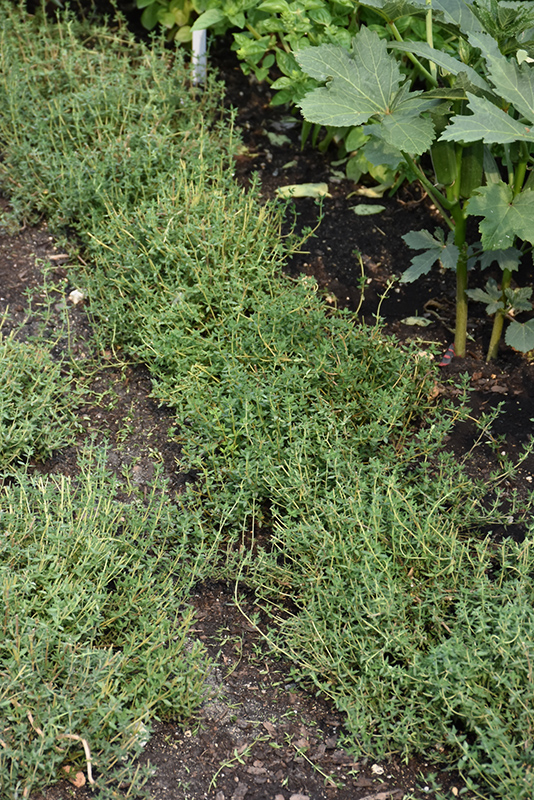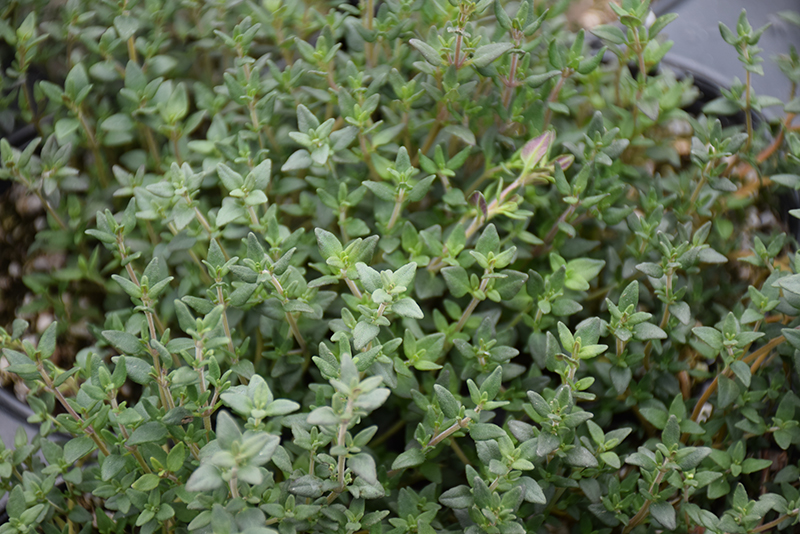Height: 12 inches
Spacing: 12 inches
Sunlight:
![]()
Hardiness Zone: 5a
Description:
A beautiful woody evergreen that smells just as amazing as it looks; low growing with a spreading habit; features dark gray-green fragrant foliage with pretty pink flowers; leaves can be dried, added to dishes or used to make compound butter
Edible Qualities
English Thyme is a perennial herb that is typically grown for its edible qualities, although it does have ornamental merits as well. The tiny fragrant round grayish green leaves can be harvested at any time in the season. The leaves have a savory taste and a pleasant fragrance.
The leaves are most often used in the following ways:
- Cooking
- Drying
- Seasoning
Features & Attributes
English Thyme is smothered in stunning clusters of pink flowers at the ends of the stems from early to mid summer. Its tiny fragrant round leaves remain grayish green in color throughout the year.
This is a dense herbaceous evergreen perennial herb with a spreading, ground-hugging habit of growth. It brings an extremely fine and delicate texture to the garden composition and should be used to full effect. This plant will require occasional maintenance and upkeep, and is best cleaned up in early spring before it resumes active growth for the season. It is a good choice for attracting bees and butterflies to your yard, but is not particularly attractive to deer who tend to leave it alone in favor of tastier treats. Gardeners should be aware of the following characteristic(s) that may warrant special consideration;
- Spreading
Aside from its primary use as an edible, English Thyme is sutiable for the following landscape applications;
- Rock/Alpine Gardens
- Border Edging
- General Garden Use
- Groundcover
- Herb Gardens
- Container Planting
Planting & Growing
English Thyme will grow to be about 12 inches tall at maturity, with a spread of 12 inches. When grown in masses or used as a bedding plant, individual plants should be spaced approximately 12 inches apart. Its foliage tends to remain dense right to the ground, not requiring facer plants in front. It grows at a medium rate, and under ideal conditions can be expected to live for approximately 10 years. As an evegreen perennial, this plant will typically keep its form and foliage year-round.
This plant is quite ornamental as well as edible, and is as much at home in a landscape or flower garden as it is in a designated herb garden. It should only be grown in full sunlight. It prefers dry to average moisture levels with very well-drained soil, and will often die in standing water. It is considered to be drought-tolerant, and thus makes an ideal choice for a low-water garden or xeriscape application. This plant does not require much in the way of fertilizing once established. It is not particular as to soil type or pH. It is highly tolerant of urban pollution and will even thrive in inner city environments. Consider applying a thick mulch around the root zone in winter to protect it in exposed locations or colder microclimates. This is a selected variety of a species not originally from North America. It can be propagated by division; however, as a cultivated variety, be aware that it may be subject to certain restrictions or prohibitions on propagation.
English Thyme is a good choice for the edible garden, but it is also well-suited for use in outdoor pots and containers. Because of its spreading habit of growth, it is ideally suited for use as a 'spiller' in the 'spiller-thriller-filler' container combination; plant it near the edges where it can spill gracefully over the pot. Note that when growing plants in outdoor containers and baskets, they may require more frequent waterings than they would in the yard or garden.


